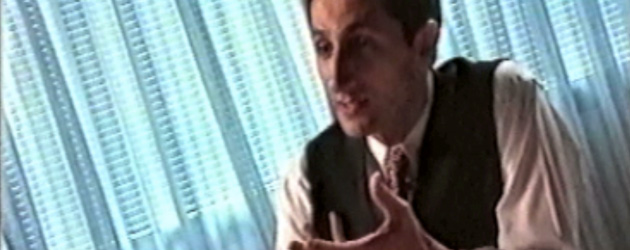
![]()
Jonar Nader says that the Internet will have to collapse before it rebuilds itself. He says that we gave people power on their desktop, but now we are taking power away, by reverting to the good old days of computing, where power reside elsewhere.
Jonar Nader sees anger as an important alarm bell. When anger strikes, we ought to stop and assess what triggered it, so that we can do something about the root-cause. Further below is a transcript of the video.
![]()
Low-res version 9 Mb 5 mins
![]()
High-res version 16 Mb 5 mins
![]()
Here is the transcript:
Male: Tonight, inside the digital revolution.
Female: We’re in the middle of a bigger change than the industrial revolution.
Male: As bits and bytes take over our lives, where is the information superhighway taking us?
Sandra Davey: It’s just an extra tool. It’s a means to an end and not an end of itself.
Male: Welcome to this special edition of the 7:30 Report. It seems hard to believe now but just a few years ago, the internet was virtually unknown and invisible to most Australians.
Jonar Nader: I have had corporations come to me and in particular, one I remember is the cereal company that came to me and said, ‘How can we now reach out target market if our target market is not watching as much television and they’re apparently on the net?’ And so, they are really concerned now how do we advertise on the net? But you know, the net is much more sophisticated than television because kids know when an ad is coming and they sensor it out and they can bypass it.
Male: Jonar Nader is a hacker turned corporate manager. Starting a couple of decades ago as a forum for scientific information sharing, the net is now whatever you want it to be.
Jonar Nader: Unfortunately, the internet will have to collapse before it rebuilds itself. Because what is happening now, it started out as a good device then it got into the hands of the marketing gurus who’ve convoluted it beyond recognition.
Male: Author, commentator, and IBM manager, Jonar Nader sees his role as dismantling a lot of media hype about the future of information technology.
Jonar Nader: The public in the future will start to use the net as a tool. Today, they’re not using it as a tool. They are using it as some sort of an exploratory device. They’re actually looking at the net as some trivial thing and – and they are actually wondering let me click here, let’s click there and see what there is. Well, that is an overuse and sometimes an abuse of the net. Pretty soon when they have faster machines, better software, faster processing, better modems, they will in fact be able to access the data they want but it will be on a needs basis not on an exploratory basis because basically, these kids will soon realize that playing a game of tennis or walking down the street is perhaps just as good and as much fun as plugging into the internet.
Sandra Davey: Where is it going in future? Well, I guess, maybe in a couple of years, it will be completely different to what we see now. I don’t know whether it will be combined with our television or our phone system or whether it will be just one big nice entertainment unit in the lounge room. As long as it’s black, I’ll be happy
Male: The black box will be here next year, the converged screen we’ve all heard so much about.
Jonar Nader: Families for example are saying, ‘Isn’t it great to converge a TV with a computer?’ But is it really? After the Christmas unwrapping, what happens thereafter if a child wants to watch TV and the parents want to play videogames or vice versa, which is often the case? So, you’ll then say that ‘Gee, this convergence is a great idea but now, I need two of them in the house to solve the family problems.’
Male: While convergence may lead to more complex machines, another development is leading towards more simplicity. The so called network computer is just hitting the market.
Don Lowe: It’s more like an appliance than like a computer. That could look like a coffee pot or something. But in fact, it’s a new way of looking at computing. And what it does is takes complexity of the traditional computing and puts it back on to the network.
Jonar Nader: It’s unfortunate the way some marketing people tend to say, ‘Wipe the slate clean. Stop the world. We have a brand new product.’
Male: While Jonar Nader sees some advantages in the simplicity of the network computer, he says it could be seen as a return to the early days of computing.
Jonar Nader: In the olden days, we had mainframes. And the person in the mainframe room had full control of what went on because you only had what was called the dumb terminal. People then complained and said, ‘I actually want a smart terminal. I want a terminal with power in my fingertips.’ So, we had the PC. Now, we’re going back again to the network computer where the power resides again in some central location and then you will have another dumb or smart terminal, whatever you call it, it’s still the same thing. In fact, some people are calling it the clever terminal for trademark purposes.
Male: Wherever the technology is going, Sandra Davey is clear about one thing.
Sandra Davey: It’s not going to solve our problems. It’s not going to make politics more inherently democratic. It’s not going to enhance in any real way the way that we communicate. It’s just an extra tool. It’s a means to an end, not an end in itself.
Male: Ray Monahan.

Comments are closed.